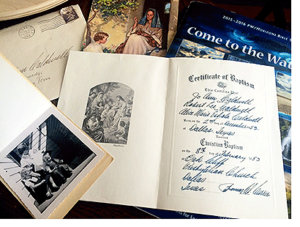Come to the Waters
Lesson Two

Life Giving Waters—Baptism
 As I write, my baptism certificate and a few photographs from that day in February of 1953 are scattered on the desk next to my laptop. I look at the black and white images of my sister, brother, and my mother sitting on our front porch steps. Mama is holding me in her arms and we are all bathed in the bright sunlight of a clear winter’s day. My father’s presence is documented only by the photos themselves. He is the person behind the camera.
As I write, my baptism certificate and a few photographs from that day in February of 1953 are scattered on the desk next to my laptop. I look at the black and white images of my sister, brother, and my mother sitting on our front porch steps. Mama is holding me in her arms and we are all bathed in the bright sunlight of a clear winter’s day. My father’s presence is documented only by the photos themselves. He is the person behind the camera.
When I look at the certificate, I see the familiar handwriting penned by the pastor who would become my father-in-law forty-six years later. These yellowing pieces of paper are treasures that my mother gave me as she sorted and sifted through mementos near the end of her earthly life. They offer a sense of grounding and belonging. They remind me who and whose I am. They shape my identity, pointing to God as the source of all good gifts.
As I’ve reflected on our lesson this month, I’ve spent a lot of time meditating on the meaning of baptism, and for the first time, I noticed the verbiage of the sacrament on my certificate. After all of the names and dates are filled in, the paper certifies that a child “Received Christian Baptism”. Received. Somehow I had missed that word over the years and it seems significant. “Received Christian Baptism” is a powerful reminder that it is God’s activity in baptism. It reflects the gracious gift and love of God. We cannot earn this gift. No matter how old we are, we simply receive, and as infants, we don’t even know that it is happening.
In our lesson, we read the story of Jesus’ baptism from the Matthew 3:13-17 account (pages 18-19). It is a familiar passage to many, and one that bears reading and rereading prayerfully and slowly as we listen for insights. Our author reminds us on page 19 that Jesus was baptized not out of the need to be cleansed, for he was without sin, but rather to be obedient to God. When Jesus came up out of the water, he received God’s affirmation of who and whose he was. The heavens opened up and the Spirit of God descended like a dove, and a voice from heaven said, “This is my Son, the Beloved, with whom I am well pleased.”
The words are powerful. Moving. Life changing. They paint a vivid picture of the scene. But beyond the content of the passage is the context in which it takes place. If we continue reading into Chapter 4 of Matthew, we see that immediately after Jesus was baptized, the Spirit led him into the wilderness to be tempted by the devil. I cannot presume to know the thoughts of Jesus, but with the placement of these two stories side by side in the Gospel, I also cannot help but think that Jesus was fortified to resist the temptations through the waters of baptism. He knew who he was. His identity as God’s Beloved Son was affirmed and strengthened.
Fast-forward to the 16th century, and we find Martin Luther, a faithful theologian and priest who sought to reform the Church. He faced many struggles as he followed his call, receiving death threats and eventual excommunication from the very Church he loved. We are told that on his darkest days, as he wrestled in the depths of his heart, he was known to repeat the words, “I am baptized. I am baptized. I am baptized.” It’s significant to note that he didn’t say, “I WAS baptized” as if it were a thing of the past. He said, “I AM baptized.” He knew his identity, even in the midst of the worst that the world had to offer, and it shaped his life. His identity was in his relationship with God, not with the Church or what people thought of him or what he did, for those things fall away. Later this month, on Reformation Sunday, many of us will sing, “A Mighty Fortress is our God” (found in the hymnal Glory to God on p.275). As we sing these words written by Luther, we will hear the source of his strength and be reminded of his words, “I am baptized.”
As I close these meandering thoughts, it occurs to me that we, too, can utter those words that affirm who and whose we are. Perhaps like Luther, when we find ourselves in the darkness, wrestling with pain or fears that overwhelm us, we will say, “I am baptized.” Or when we are in the wilderness of our culture and are tempted to find our identity in what we own, how we look, or what people say about us, we will stop and remember that these things do not define us. We will remember that our identity is in our source. Perhaps we can even work these words into an everyday ritual and prayer as we prepare to go out into the world, seeking to be obedient to God and to live into the call to serve as the hands, arms, and face of Christ, as our author reminds us on page 20. What if each day, as we “came to the waters” of our daily life (brushing our teeth, washing our hands or dishes, watering gardens, or showering) we developed the practice of repeating “I am baptized.” For those who have not been baptized, you might use the words “I am a child/daughter of God. I belong to God who loves me.” I wonder how it might change our nights and days if these, or similar, words became connected to our senses through the sound and touch of water? It’s going to be my prayer practice this fall. Perhaps you’ll join me.
What are your stories around the sacrament of baptism? How will you live into the call to live as God’s hands, arms, and face of Christ in this fragile world? What memories or thoughts has this study or blog stirred in your hearts? I look forward to hearing from you as together, as Presbyterian Women, we “come to the waters.”
With love and a grateful heart . . .
Jo Ann Currie
Director of Christian Education and Spiritual
